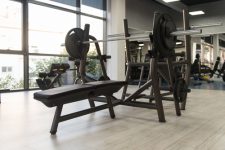Tragic Death of Teen on Bench Press

An investigation is underway into the tragic death of a teenager who was found crushed under 98 kilograms of weight.
Lanky fifteen-year old Ben Shaw was at a gym in Pine Rivers, Queensland when it is believed the bar bearing the weight plates fell onto his neck.
A staff member reportedly found Ben about 20 minutes later, pinned under the bar. Staff and other gym members rendered first aid before paramedics rushed Ben to Lady Cilento Children’s Hospital, where he later died.
The gym is now closed while Workplace Health & Safety as well as Queensland Police investigate what happened and prepare a report for the coroner.
More questions than answers
A policy of the PCYC gym is that anyone under the age of 16 must complete an induction with a parent or guardian and be supervised at all times.
There are now questions around the exact nature of the supervision the young man was under at the time of the incident, and precisely how it occurred. There are also questions about why it took so long for the incident to be discovered.
Duty of care
There are also broader questions around the responsibilities of gym operators and users.
Civil lawyers explain that while general laws regarding duties of care apply, there are no specific laws relating to the fitness industry.
Gym owners are required to provide: a safe work environment, safe equipment and information, training, as well as clear instruction and supervision necessary to protect people from risks to their health, but the fitness industry is largely self-regulated.
Fitness Industry Australia explains that industry regulations vary across states and territories. All gyms must adhere to rules relating to consumer protection and fair trading, dealing with issues such as membership contracts, client care, standards of qualifications and standards of business practice, facilities and equipment.
The industry has developed its own Industry Code of Practice, but In New South Wales, only part of the code is mandatory.
Waivers of responsibility
Gym memberships are likely to contain waivers of responsibility in order to prevent members from making claims, but civil lawyers explain that this does not absolve owners and operators of responsibility.
If a gym breaches its duty of care by failing, for example, to prepare equipment in a safe manner, or to provide adequate supervision, it may not be able to rely on a signed waiver.
24-hour facilities
With the rise in 24-hour facilities that are largely unsupervised outside of normal business hours, there is a greater risk to patrons if an accident occurs and there is no one around to help.
While you may be covered by the gym’s insurance policy, it’s not always a guarantee and these kinds of court cases can get complicated.
A personal trainer’s ‘duty of care’ responsibilities are currently the subject of a complicated civil suit in Sydney.
Negligence at centre of civil law suit
Gym goer Daniel Popp is suing Snap Fitness for negligence after being hospitalised for more than a week following a session with a personal trainer.
Doctors diagnosed Daniel with rhabdomyolysis – the rapid breakdown of seriously injured muscle tissue, severe enough to threaten his kidney function. His discharge summary blamed ‘excessive exercise’ for the condition.
Daniel is claiming around $200,000 in damages, on the basis that his personal trainer ‘pushed him too hard’ despite complaints about experiencing significant pain in the legs and groin, and the fact he had vomited in the toilet.
The Personal Trainer (PT) contends that the exercise programme is safe and suitable to tone up. He denies being informed about any vomiting.
Both Snap Fitness and the personal trainer, James Fallow, deny that Daniel’s injuries were a result of the personal training session. But to make matters more complex, Snap Fitness has also argued that it is not responsible for the actions of a personal trainer.
The company says that despite the fact the PT signed Daniel up at the gym, worked exclusively for Snap Fitness and wore a company uniform, he was not an ‘employee’ or ‘agent’ at the time. It claims the company is therefore not liable for any injury sustained.
The gym chain also denies it has a duty of care to ensure training sessions are provided with both ‘due care and skill’.







